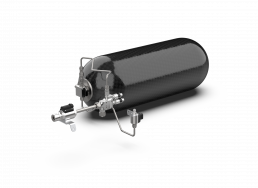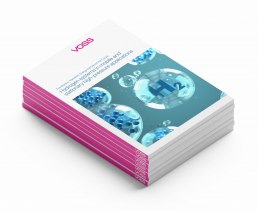In our series on hydrogen applications, we have already provided a brief overview of why hydrogen is such an important topic for plant engineering, and therefore for us at the VOSS Group. Wherever hydrogen needs to flow, secure lines and connections for transporting and storing H2 are essential. An overall system concept is important for us in plant engineering as well. VOSS designs ready-to-install line systems, as well as fully assembled plug and play assemblies for hydrogen applications, tailored to individual customer requirements.
Let’s start with an example of an application where our solutions are used in plant engineering: industrialization of electrolyzers. Electrolyzers are used in a wide range of applications and areas: in so-called power-to-heat and power-to-gas solutions, as power storage and in industry, as well as in the area of mobility and research. The technical requirements for such systems for processing hydrogen are high, because the pressures and temperatures used push the materials used to their limits. Therefore, all hydrogen applications require one thing: durable and secure tube connections.
With such a volatile medium as hydrogen, in particular, it is essential to avoid even the smallest leaks. Whether we are working in a low pressure range, as with electrolysis, or in high pressure systems, like hydrogen filling stations, is immaterial. The VOSS Group manufactures series-stable line and connection systems, as well as valve technology for many different applications, equipped with the proven VOSS Lok40 connection system. Other examples of where our system solutions are used include steam reforming systems, mobile fueling stations, hydrogen trailers used to transport hydrogen, and distribution stations in gas networks, which are to be retrofitted successively to distribute hydrogen.
Containers for power generation using hydrogen
One thing is clear: Germany will continue to import a large portion of its hydrogen in the future. Countries like Spain, Morocco, Australia, Chile, and Norway, to name just a few examples, have long coastlines, meaning they have ideal conditions to generate power using photovoltaic systems. This also means they have better conditions to generate hydrogen than Germany does. There are different transportation options to bring hydrogen from these countries to Germany. As of yet there are few hydrogen pipelines, which would likely be the most economical solution for transportation over long distances. Therefore, in Germany we have to generate our own hydrogen – ideally through “green” renewable energy and processes. The most widespread and well-developed solutions for hydrogen generation at present include stationary and mobile containers. Hydrogen generation systems can be installed directly on site at locations where power is produced, such as at wind or solar farms. Further processing can then be carried out by generating, storing, filling, transporting, and fueling the hydrogen. A large number of lines and connections are needed for each container system. And, what’s more, each container has a control center for the hydrogen cycle – a control cabinet.
System solutions approach for plant engineering
The heart of our portfolio of solutions for plant engineering is our VOSS Lok40 connection system. It ensures durable and secure connections of tubes used in hydrogen applications, with the highest resistance to leaks in all pressure ranges, and for a range of gaseous media. This reliability results on the one hand from the interaction of the tube contour and the screw fitting piece and on the other hand from the assembly reliability of the system. Our Valves also prove their advantages here: they fit perfectly to the contour of the VOSS Lok40 and ensure a very well-sealed connection in hydrogen and gas-based drive systems – in particular in the high-pressure range of up to 700 bar.

Especially in the hydrogen sector, VOSS stands for systems expertise and the goal of standardizing and industrializing systems to get them ready for the market. We are experts in developing and producing customer-specific system solutions for both mobile and stationary applications. In doing so, we work along the entire hydrogen supply chain: from producing the hydrogen itself, for instance via electrolysis, to storing and transporting the hydrogen, and even distributing it to the consumer. This also includes the fuel cell itself, in which thermal management of cooling cycles is an important application.
Would you like to learn more about H2?
Our free whitepaper „The World in Transition: Energy Carriers of the Future. Hydrogen systems in mobile and stationary high-pressure applications“ illustrates the many different potential applications for hydrogen, and discusses the current state of the art.
